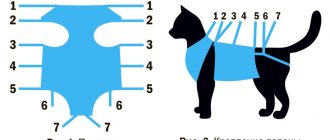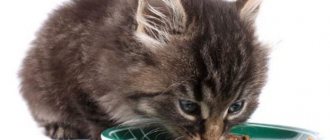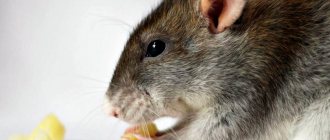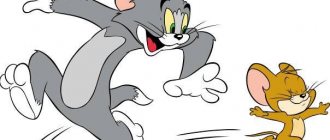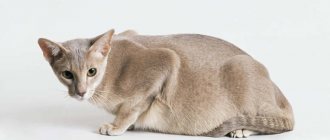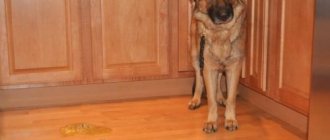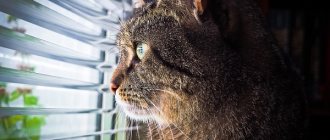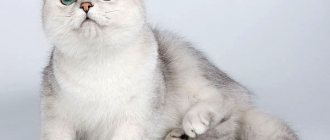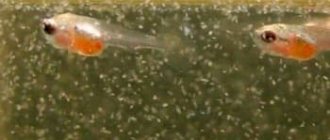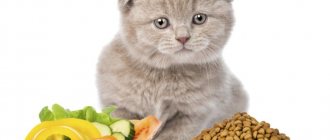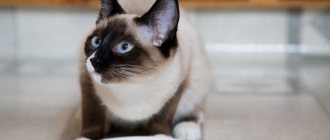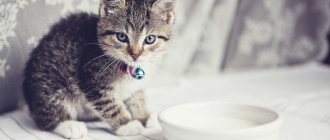How to feed a pregnant cat so that she gives birth to healthy offspring?
Veterinarians note several important periods in gestation, during which it is necessary to adjust the nutrition of a pregnant cat.
During the first trimester of a cat’s pregnancy, the animal’s behavior remains virtually unchanged; you may notice only a slight increase in appetite and a decrease in your pet’s activity.
The second trimester is characterized by the appearance of external signs indicating that the cat is pregnant - the belly enlarges, the nipples turn pink. During this period, you can do an ultrasound and find out how many kittens the cat will have.
In the third trimester of a cat’s pregnancy, the kittens can be seen moving in the mother’s belly, and the babies acquire fur.
A pregnant cat does not need special care. However, you should know a few important rules on how to properly feed a pregnant cat .
Dry food or natural food
With the onset of pregnancy in a cat, owners often rack their brains over what diet to choose for their pet. Unfortunately, there is a common myth according to which dry food can significantly harm a cat’s body during the period of gestation. This statement is a myth because it is not supported by real cases.
As most experienced cat owners know well, switching to a new type of food for an animal is not easy. It will be even more difficult for a pregnant pet if in a couple of weeks she is required to radically change all her eating habits. In addition to the fact that such stress will simply be harmful, it also makes no sense, since these days there are special lines of dry food designed specifically for pregnant pets.
The choice between natural and dry food depends on the cat’s previous eating habits.
The rule regarding feeding pregnant cats is to leave the animal on the same food it had before fertilization. If it was natural food, keep the same natural products; if it was dry food, look for special food from the same manufacturer. If you give your pet food of at least premium class, you can always find options for this in their line.
Dry food for pregnant cats
Dry food for pregnant cats contains all the necessary nutritional elements, relieving the pet owner of the need to carefully think through the animal’s menu. All a person needs to do is pour a fixed amount of granules into the individual’s bowl.
The most popular foods used to feed pregnant cats are presented in the table below.
Table 1. Dry food for pregnant cats
| Feed | Description | Price |
Royal Canin Queen 34 | Royal Canin is a universally recognized manufacturer of premium-segment food, which can be easily found in any pet store. The food developed for pregnant cats has an optimal percentage of fat, which allows you to provide the female with energy, and at the same time is not excessively high in calories. The granules also contain special fatty acids that promote lactation and improve the quality of milk. The main food "Queen 34" is poultry; rice, corn, yeast and fish oil are used as additional components | 1800 rubles for 4 kilograms |
Hill's Science Plan Kitten Healthy Development Chicken | Food from this line is well suited for both kittens and cats during pregnancy, regardless of their breed. The food is based on chicken meat, which is easily digested by the cat's stomach without causing discomfort. Hill's Science Plan is a representative of the premium segment, and its products are quite affordable. The owners note two main disadvantages of this brand of food. The first drawback is the presence of corn, to which some individuals are allergic. The second disadvantage is the presence of salt, which interferes with the removal of fluid from the body. The cats themselves react to the food differently - some eat it with pleasure, some cannot tolerate its composition | 1500 rubles for 2 kilograms |
Acana Pacifica | This manufacturer considers itself to be in the super-premium segment, which is directly reflected in the cost of its products, which are twice the cost of Royal Canin food. The high cost of products of this brand is explained by the high-quality composition - the share of natural protein in their feed is at least 70%. The base component is the meat of fish such as perch, flounder, and sardine. Acana Pacifica completely eliminates the addition of grains, starch and genetically modified elements to its feed. Despite the fact that the manufacturer does not have a separate line for pregnant cats, any food of this brand is suitable for females due to its complete harmlessness to fetuses | 1700 rubles for 2 kilograms |
Nutra Mix PROFESSIONAL for Cats | Manufacturers of Nutra Mix Professional food produce universal products that are suitable for both show and ordinary mature cats. Their food belongs to the super-premium segment and is treated with special care, and therefore is suitable for all pregnant pets. The products of this brand contain a competent combination of protein and selected grains, and a moderate amount of salt allows the cat to avoid painful changes in electrolyte balance. The main disadvantage of the food is the presence of the same corn, to which some cats may have a negative reaction. | 500 rubles per 1 kilogram |
Josera Minette | Josera super-premium products are quite difficult to find in pet stores, but with the Internet you can easily order them. Thanks to its well-thought-out composition, Josera food is ideal for cats prone to allergic reactions due to the complete absence of flavors, dyes and preservatives. Vitamins and beneficial microelements of the Minette line of food are arranged in such a way that they allow a pregnant cat to maintain good quality of coat, skin and internal organs at a high level. | 4300 for 10 kilograms |
Natural nutrition
Feeding a cat with natural products requires certain skills from the owner, since incorrect calculation of ingredients can lead to significant disruptions in the functioning of the animal’s body. These disruptions will be especially painful for a pregnant cat, which, in addition to self-saturation, needs to provide kittens with nutritional resources.
When using natural products, it is important to correctly calculate their proportions and dosage
Protein
Protein is the most important structuring element of any diet. It is protein that contributes to the proper development of fetuses in the pet’s uterus, as well as strengthening the health of the cat itself. Being the main source of energy, this element is dominant and is found in the following products:
- meat (pregnant cats are best given lean beef, veal or poultry);
- chicken eggs (boiled);
- dairy and fermented milk products (cottage cheese, kefir, yogurt).
Cats get their protein primarily from meat.
Fish can also be a valuable source of protein, but it is not recommended to focus on it during pregnancy. As an exception (if your pet has the most tender feelings for such food), you can give well-cooked sea fish no more than once every week and a half. Since fish often contains parasites, the owner can never be sure that they will bypass his animal (even if the fish has been heat-treated).
In addition to meat and milk, protein is also found in vegetables, but cats’ bodies are not designed to digest vegetable food, and therefore it is not recommended to feed expectant mothers with it. Otherwise, you may encounter digestive disorders and other unpleasant aspects of a malfunction of the gastrointestinal tract.
It is not advisable to give pregnant cats vegetables due to their poor digestibility.
Carbohydrates
Like proteins, carbohydrates are not absorbed in all of their varieties. For example, lactose and milk sugar contained in cow's milk are of no value to the cat's body and can even harm it. Cats replenish carbohydrates with the following cereals:
- buckwheat;
- barley;
- rice
You can add richer ingredients to your porridge to attract your cat's attention.
Since cereals as such are rarely of interest to furry pets, they become the basis for all sorts of mash with the addition of meat and (occasionally) some vegetables, which give such cereals an interesting taste.
Fats
Fats are an important energy resource; moreover, one unit of fat contains more energy than the proteins we discussed above. Cats get the bulk of their fat from meat, without the need for additional sources of this element. However, during pregnancy the need for fats increases, so some veterinarians advise adding the following products to females’ food:
- olive or unrefined sunflower oil. It is most convenient to add this oil to mash and porridge, one teaspoon per serving;
- fish fat. Unlike humans, cats consume fish oil more readily. You can buy it in a regular pharmacy in capsule form. It is advisable to discuss the number of capsules per day with your veterinarian in advance, since fish oil is technically still a medicinal product.
A spoonful of olive oil will not only provide your cat with vegetable fats, but will also protect her from constipation.
A lack of fat in a cat’s body is dangerous, first of all, due to the underdevelopment of embryos, as well as disruption of metabolic processes in the mother.
Calcium
Calcium, of course, should be present in the diet of a pregnant cat, but in strictly limited quantities, since its excess is just as dangerous as its deficiency:
- an excess of calcium negatively affects the development of embryos and can lead to deformation of their skulls due to excessive bone growth;
- A lack of calcium often complicates the birth process and the recovery period of the mother cat. In particular, a lack of calcium is often associated with a phenomenon such as childbed fever.
One of the main suppliers of calcium for cats is cottage cheese.
The pet begins to consume calcium only from the second half of its pregnancy (around the thirtieth day) and already 20 days before giving birth, the consumption of this element stops. Accordingly, a pregnant cat needs calcium for only a week and a half.
Calcium is found in the following foods:
- bone flour;
- soft bones;
- cottage cheese;
- eggshell.
Crushed eggshells can be added to porridge in small quantities
Since the animal is not recommended to consume bone meal or bones during gestation, the main emphasis is on cottage cheese or eggshells ground until smooth. Also, with natural feeding, cats are often prescribed vitamin and mineral complexes designed to balance metabolic processes in the body. Often additional sources of calcium are introduced to balance the amount of phosphorus.
Phosphorus
The main sources of phosphorus are meat and fish. Phosphorus is an element that is often found in excess in a cat’s body. Therefore, most diets involve a special balance of phosphorus content. It is important that these animals consume calcium and phosphorus in a 1:1 ratio so as not to disrupt calcium-phosphorus metabolism.
Individually, phosphorus is found in some vitamins.
Useful microelements
Other microelements that play an important role in the development of fetuses and maintaining the health of a pregnant female include the following:
- proteins – proteins are the simplest proteins and are directly involved in the formation of embryos. A lack of proteins leads to the mother cat losing muscle mass, which makes the animal weaker and more vulnerable;
- Taurine – Taurine is an amino acid that is a component of animal proteins. If your pet's diet is balanced, then she gets enough taurine from her food. If a cat shows clinical signs of taurine deficiency, the veterinarian will prescribe special supplements that contain this element;
Taurine is found primarily in seafood
- iron – iron prevents anemia and all complications that may be associated with it and negatively affect the animal’s pregnancy. This element is found in products such as liver or kidneys (beef), however, such products are completely unhealthful for pregnant cats. The dosage of iron must be handled very carefully, since its excess leads to disturbances in the digestion of food and painful constipation;
- Folic acid – this acid is a vitamin that contributes to the most successful pregnancy in a cat. It is advisable to give these vitamins to cats both shortly before fertilization and during pregnancy itself so that they can give the greatest effect. The dosage of folic acid is determined by the veterinarian, and it is sold in tablet form.
Folic Acid is an Ingredient in Supplements for Pregnant Cats
Educational program on some elements
Folic acid. At the beginning of pregnancy (about a couple of weeks after mating) and before conception (at least 3 months), it is a good idea to give your cat folic acid. This connection is actively involved:
- in DNA synthesis and cell division;
- formation of the blood system in future offspring;
- formation of the neural tube and brain of the embryo.
Calcium and phosphorus. Experts also give recommendations on the use of calcium in the diet. Usually it is included only in the second half of pregnancy (by the way, it lasts on average 65 days), and 3 weeks before birth it is excluded from the cat’s menu.
- Excess calcium will provoke the growth of the skull bones and a lag in the development of already born kittens.
- Lack of calcium is the cause of eclampsia in a woman in labor (the appearance of convulsions, fever and even death) and puerperal fever.
As for phosphorus, this element is found in abundance in meat, so when selecting vitamin and mineral supplements, make sure that it is not there. Otherwise, you can get an imbalance in calcium-phosphorus metabolism.
It is believed that when feeding naturally, additional calcium must be included in the diet to balance out phosphorus: 100 g of meat product should contain 150 mg of calcium. It is better to give it in its natural form, for example, by grinding eggshells into powder.
But trying to feed a pregnant cat with calcium gluconate is a waste of time, since calcium is absorbed by the body only from the carbonate compound. For better absorption of the mineral component, you can use fish oil.
Protein is necessary for the formation of all tissues and is involved in milk production during lactation. With a lack of protein, the animal loses muscle mass.
Taurine is an amino acid. With its deficiency, miscarriage or death of the offspring occurs in the middle of pregnancy, and the birth of underdeveloped and sick kittens is possible.
Fatty acids, such as linoleic and arachidonic acids, are also important in maintaining pregnancy. If they are deficient, unborn offspring may die, and in the future the cat will become infertile.
Copper and iron are elements that must be present in the diet to prevent the development of anemia, but their excess will lead to constipation.
Feeding by trimester
Conventionally, pregnancy in a cat is divided into three time periods or trimesters, each of which has its own rules and feeding features.
First trimester
During the first trimester, embryos are still quite small, and external signs of pregnancy are not obvious. However, due to the fact that hormonal changes in the mother’s body have already begun, the owner in any case has to adapt to her increasing appetite. It is important not to overfeed the cat, since excess food will lead to obesity, which can only complicate the birth process.
By the way! It is worth noting that a clear increase in interest in food is not observed in all pets in the early stages. Some animals, on the contrary, exhibit an aversion to food. Therefore, when calculating portions, it is important to take into account the current condition of the pet.
During the first trimester, the amount of food increased by ten percent
It is generally accepted to increase the diet by a tenth of the previous amount of food. An increase in food consumption occurs due to increased frequency of meals. If previously the cat fed 2-3 times a day, now it should be fed at least 4-5 times. This will satisfy your cat's hunger without overloading its digestive system.
Second trimester
The second trimester begins on the twentieth day and is marked by a repeated increase in the food the cat eats. Embryos increase in size and require more nutrients, which is clearly felt by the pet. During the second trimester, the animal consumes twice as much food compared to its diet before pregnancy.
The second trimester takes away a large amount of nutritional resources from the cat, which it replenishes through food.
Third trimester
The second half of the final month of pregnancy is accompanied by a gradual decrease in appetite, which occurs for several reasons:
- the embryos begin to put pressure on the pet’s stomach, which is often in an irritated state;
- kittens no longer need the same amount of food for intensive growth, completing their intrauterine development;
- The animal’s body instinctively begins preparing for childbirth and gets rid of all kinds of extra calories.
Therefore, if at this moment you notice how your cat is losing interest in food, do not worry about its health - in most cases, this condition is completely natural.
The third trimester is accompanied by the completion of fetal development and a decrease in their need for food
A few weeks before giving birth, the number of meals is increased even more, up to six times a day, in order to reduce the amount of food in the portions themselves. The total amount of feed consumed per day remains unchanged.
A week before giving birth, the cat returns to the same volumes of food that she had before pregnancy, and the frequency of feedings is reduced to three times a day. The animal’s intestines are gradually unloading, preparing for an important date, therefore, as it approaches the birth, the pet will approach the bowl of food less and less often.
As the birth approaches, the cat loses interest in food
Advice from veterinarians
In the second trimester of pregnancy, doctors recommend introducing nettles into your pet’s menu, which should first be doused with boiling water and then chopped. This folk remedy helps improve lactation. It would also be a good idea to give the animal a decoction of raspberry leaves twice a day. To prepare the drink, you need to use about a tablespoon of chopped herbs and a glass of hot water. Give the decoction in the amount of a teaspoon.
Cheap and low-quality dry food is the enemy of a cat expecting offspring. During this period, you need to pay special attention to the quality menu of your pet, be it ready-made food or natural food. Increasing the amount of food does not always provide the necessary amount of vitamins and nutrients for both the cat and future offspring.
Daily ration
The question of the daily diet is quite complex and does not have a universal answer in the form of a ready-made diagram. The amount of food a cat eats per day is influenced by several factors:
- breed of animal (and dimensions associated with the breed);
- age of the animal;
- number of embryos;
- gestational age;
- specificity of metabolic processes;
- type of feeding (natural and dry food require different dosages).
The amount of food in a pregnant cat's bowl is calculated individually
If you do not take into account the specific trimester, and outline the daily diet of an average-sized pregnant cat (weighing 3-4 kilograms), it will consist of the following items:
- meat (beef, chicken, turkey) – about 160-170 grams;
- fermented milk products (kefir, yogurt, yogurt) – about 50 grams;
- green grass - from 60 to 80 grams;
- chicken eggs (yolk only) – one egg every one and a half weeks;
- sea fish (boiled only) – one serving per week.
In purebred cats, pregnancy may be more difficult than in domestic cats.
It is believed that it is most difficult to select a diet for purebred cats, such as British, Scottish or Persian. However, no matter how purebred your pet is, it is one way or another recommended to show it to a veterinarian so that he can examine the animal and, if necessary, prescribe additional vitamin complexes. You can read about vitamins suitable for both pregnant cats and kittens below.
Vitamins for cats and kittens
What does a cat need?
During pregnancy, the body needs more nutrients. This applies not only to a quantitative increase in food (due to the volume of portions), but also to a qualitative change in nutrition.
The nutritional features of a pregnant cat are as follows:
- Greater protein intake. If 20% of the total protein is enough for an adult pet, then this will not be enough for a pregnant cat. The optimal dose is considered to be 35–40%. If there is a protein deficiency, the fetus will not be able to grow normally or gain muscle mass, which is why the baby will be born weak.
- More vitamin D and phosphorus. These components are needed to ensure the development and normal condition of the skeletal system.
- Increased calorie content. The pregnancy period is characterized by an increase in energy expenditure, which is compensated by calories. This is achieved by increasing the serving size or more frequent feeding.
- Sufficient volume of liquid. This is especially true when using dry food for pregnant cats.
- Greater intake of animal fats such as Omega-3, Omega-6. This will have a positive effect not only on the health of the expectant mother, but also on the development of the kittens’ central nervous system.
What a pregnant cat shouldn't eat
As already mentioned, the diet of a pregnant cat differs little from the diet of the animal before pregnancy. The main changes concern not the products themselves, but their proper combination and dosage. Therefore, it is difficult to name a specific product that was useful to the pet before fertilization and became harmful after.
During pregnancy, cats may begin to try foods that are unusual for them.
However, it should be borne in mind that due to changes in hormonal levels, a cat’s taste preferences may radically change, so it may completely refuse the food it previously adored. In such cases, it is not advisable to force feed the animal - it is advisable to temporarily adjust the diet to suit the pet so that the food does not cause her dislike, but a healthy sense of appetite.
Prohibited Products
An approximate list of foods prohibited for pregnant pets is as follows:
- smoked, salted, dried food;
- all kinds of canned fish;
- sausage;
- bones;
- sweets;
- any food from the human table.
As you can easily see, the same list applies to any cats, since the listed products are equally harmful to these animals, regardless of their age, breed and physiological condition.
Pregnant cats should absolutely not eat food from the human table.
What is forbidden to give
Regardless of the breed, you need to remember that for the birth of healthy offspring there are a number of drugs that should absolutely not be given during pregnancy. These substances include various medications and anthelmintic drugs. In addition, vaccinations, antibiotics, hormones, and aggressive medications for fleas or other parasites are excluded.
© shutterstock
In case of urgent need to treat for any disease, an experienced veterinarian will prescribe the most gentle treatment possible.
Feeding tips
Among the “food” tips that will make it easier for a cat to endure pregnancy, we list the main ones:
- Since cats sometimes have problems with bowel movements during pregnancy, they are recommended to be given vegetable meat or low-fat meat broths. Some owners pour milk into their cats to treat constipation, but in adults this product causes indigestion and diarrhea, which, although it overcomes the disease, does not do so in the most pleasant way;
- a couple of weeks before giving birth, cats are recommended to make a special decoction of nettles - this drink helps improve lactation;
The decoction can be given to cats not only during pregnancy, but also while feeding kittens.
- Some cat lovers recommend giving your cat a decoction based on raspberries, since this berry can facilitate the process of childbirth and subsequent recovery. “Research” has not been conducted to confirm this statement, so the exact connection between raspberries and childbirth is unknown.
Individual selection
Not every brand of food, even super-premium, is suitable for all kisuls in a row! The owner sometimes tries for a long time to give one food or another until he makes the final choice.
It takes many factors into account. For example, does the cat like this food and does it have a good appetite? The main thing is how it is absorbed, which the quality of the fur will clearly “tell”: if it is thick, healthy and beautiful, then everything is in order.
By the way, there is a possibility... that a cat's tastes will change over time. For example, during her third pregnancy, she may give up her previously favorite diet!
Replace regular food with specialized food gradually, preferably from the same company. Or simply increase your previous diet.
How does feeding affect pregnancy in cats?
A well-fed pregnant cat feels good.
In addition to the metamorphoses that occur with internal organs, metabolism also changes. Initially, there may be an increase in appetite, the absorption of nutrients also increases, which leads to an increase in body weight.
By the end of the gestation period, the animal may lose weight, and if improperly fed, it may even suffer from exhaustion. Errors in the preparation of the diet, when an insufficient amount of nutrients enters the body, will lead to disruption of the formation of the offspring’s bones, internal organs and a general developmental delay.
- With insufficient mineral metabolism, bone tissue does not receive the necessary substances for its structure, which can lead to rickets.
- Violation of salt metabolism affects the condition of the teeth.
- An insufficient amount of vitamins affects the development of the nervous system, the growth of internal organs and leads to developmental defects.
- A lack of amino acids and proteins (the main building material) will even provoke a miscarriage: nature always gets rid of unnecessary ballast that is unadapted to normal life.
That is why feeding should be balanced and varied, and most importantly, complete. This is especially important in the first month after conception, when all the internal systems of the body are being formed.
